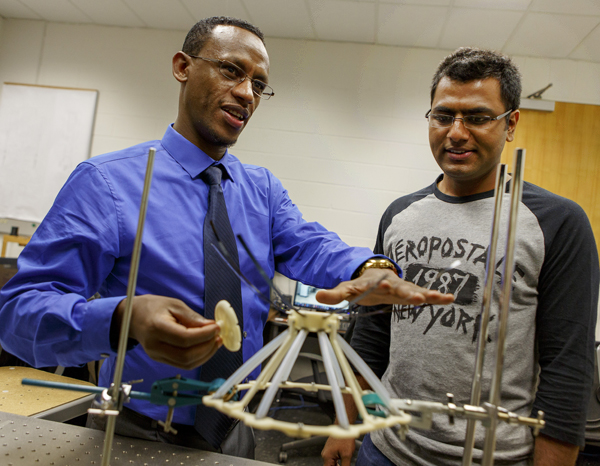The Texas Higher Education Coordinating Board has approved a doctoral degree program in mechanical engineering at The University of Texas at Dallas, offered in partnership with The University of Texas at Arlington.

The Department of Mechanical Engineering began offering bachelor’s and master’s degrees in 2008, and now has 474 students enrolled. Above: Dr. Yonas Tadesse, an assistant professor, helps student Avinash Honnavally with a demonstration.
The program, administered through the Department of Mechanical Engineering in the Erik Jonsson School of Engineering and Computer Science and open for enrollment next semester, is designed to help fulfill a need for continued technology-based economic development in the Dallas area and state.
PhD students will be instructed in advanced core principles and have the chance to conduct research that will ultimately help solve problems in energy, health care, security and transportation.
“We are grateful for the partnership of our sister institution in making it possible to provide a much-needed and highly desirable degree for which there is a growing market,” said Dr. David E. Daniel, president of UT Dallas.
More than 14 percent of engineers in the U.S. work in mechanical engineering, making it the second-largest engineering specialty, according to the U.S. Bureau of Labor Statistics. Texas produces a lower percentage of mechanical engineering doctoral graduates than other high-technology states.
“The Texas economy, even more than the national economy, depends on leapfrogging traditional areas in order to establish leadership in emerging technologies,” said Dr. Mark W. Spong, dean of the Jonsson School. “This new program will provide the quality education needed to fulfill this unmet local need, and contribute to the broader economy.”
“The Texas economy, even more than the national economy, depends on leapfrogging traditional areas in order to establish leadership in emerging technologies. This new program will provide the quality education needed to fulfill this unmet local need, and contribute to the broader economy.”
Dr. Mark W. Spong,
dean of the
Jonsson School
of Engineering
Because of the presence of large defense manufacturing and systems integration companies, the Dallas area hosts a larger percentage of mechanical engineers than many comparable regions. In several of those companies, more than 50 percent of their workforce is older than 50 years of age. A robust stream of mechanical engineering graduates is necessary to help these companies, as well as those in the oil and gas and semiconductor fields, remain viable and innovative.
“Doctoral graduates are key to new knowledge and the transfer of that knowledge to industry,” said Dr. Mario Rotea, head of the Department of Mechanical Engineering. “Our program will produce innovations that allow us to be competitive in a global society.”
The new doctoral program will help the University’s climb to reach enrollment and research funding levels on par with national research universities.
The Department of Mechanical Engineering began offering bachelor’s and master’s degrees in 2008, and now has 474 students enrolled. The Jonsson School averages more than $420,000 in research expenditures per faculty member. Both of these numbers are expected to increase with the addition of the new program.
Having the complete span of degrees – bachelor’s, master’s and doctoral – in mechanical engineering will benefit undergraduate engineering students.
“Doctoral students typically become mentors for undergraduates,” Rotea said. “They’re often a key part of enabling the undergraduate research experience.”